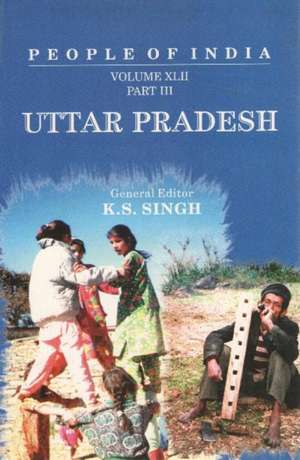People of India: Volume XLII: Uttar Pradesh (in 3 Parts)
Autor K. S. Singhen Limba Engleză Hardback – 31 dec 2004
Preț: 1084.40 lei
Preț vechi: 1522.35 lei
-29% Nou
Puncte Express: 1627
Preț estimativ în valută:
207.52€ • 225.34$ • 174.32£
207.52€ • 225.34$ • 174.32£
Carte indisponibilă temporar
Doresc să fiu notificat când acest titlu va fi disponibil:
Se trimite...
Preluare comenzi: 021 569.72.76
Specificații
ISBN-13: 9788173041143
ISBN-10: 8173041148
Pagini: 1786
Ilustrații: 49 illus
Dimensiuni: 160 x 250 x 104 mm
Greutate: 3.17 kg
Editura: Manohar Publishers
Colecția Manohar Publishers (IND)
ISBN-10: 8173041148
Pagini: 1786
Ilustrații: 49 illus
Dimensiuni: 160 x 250 x 104 mm
Greutate: 3.17 kg
Editura: Manohar Publishers
Colecția Manohar Publishers (IND)
Cuprins
List of Illustrations; A Note on the Series; Foreword; Acknowledgements; Part One: Introduction; The Communities; Aarakh; Adh Brahman; Agaria; Agarwal; Agrahari; Aheriya; Ahmadiya; Anglo-Indian; Anwal; Atisbaz; Badhik; Badhiphul; Badi; Bagban; Bahelia; Bahrupia; Baiswar; Bajania-Nat; Bajigar; Bakar Qassab; Baksor; Balahar/Vargi; Balai; Balmiki; Bandhmati (Hindu); Bangali; Banjara; Bansphor; Barai/Baseeth; Bargala; Bargujar; Barhai; Bari; Barnwal; Barwar; Basor; Bati; Bawarchi; Bawariya; Bayar; Bedia; Behna; Beldar; Belwar; Bengali/Bangali; Bhal Brahman; Bhand; Bhantu; Bhar; Bhargawa; Bhatiara; Bhisti; Bhoksa; Bhotia; Bhuiya; Bhuiyar; Bhumihar; Bhurji; Bhurtia; Bhuvaria (Lohpita); Bind; Bisati; Boria; Bot; Brahm Bhatt; Brijbasi Nat; Chamar; Chamar, Jatava; Charwaha; Chero; Chhetri; Chhimpi; Chimba; Dabgar; Dafali; Dakaut; Dalera/Dalere; Darzi; Dhagi; Dhakra; Dhangar; Dhanuk; Dhari; Dharkar; Dhobi; Dilliwal Shaikh; Dom; Domar; Dusadh; Faqir; Part Two: Gaddi; Gaderia; Gadhia; Gahoi; Gandharv/Gandharb; Gandhila; Gangadi Brahman; Gangaputra Brahman; Garha; Garhwali Jimdar Rajput; Garhwali Rajput; Gautam; Gawal/Gual; Ghasia; Ghassal; Ghate Bania; Ghosi; Gond; Goriya; Gurkha Brahman; Gurkha Damai; Gurkha Sonar; Gurkha Thakur; Gurung; Habura; Halalkhor; Halbani Brahman; Halwai; Hela; Hijra; Irani; Iraqi; Jaga; Jat; Jaunsari; Jhamar; Jhojha; Jogi; Jogi Faqir; Joshi Brahman; Jujhautiya Brahman; Kachhi; Kahar; Kalabaz; Kalander; Kalwar; Kamangar; Kamboj; Kami; Kanjar; Kankali; Kanmailia; Kanyakubja Brahman; Kapariya; Karwal; Kasai; Kasaudhan Bania; Kasgar; Kashmiri Pandit; Kattaha Brahman; Kayastha; Kesarwani Bania; Kewat; Khairaha; Khandelwal; Khangar; Kharkata; Kharwar; Khatik; Khattri; Khurpalta; Kingharia; Koeri; Kol; Kori; Korwa; Koshtha; Kumaoni Jimdar Rajput; Kumaoni Rajput; Kumhar; Kunjra; Kurmi; Kuta; Kuthliya Bora; Lal Begi; Limbu; Lodh; Lohar; Lunia; Madari; Magar; Mahawat; Maheshwari; Mali; Mall; Manihar; Manjhi; Maratha; Mathur Chaturvedi; Mazhabi; Meo; Mian; Mirasi; Mochi; Momin Ansari; Momin Ansari; Mujavir; Muker; Murao; Musahar; Musalman; Muslim Banbati; Muslim Banjara; Muslim Dhagi; Muslim Dhobi; Muslim Gujar; Muslim Halwai; Muslim Kayasth; Muslim Nai; Muslim Nat; Muslim Rajput; Muslim Teli; Part Three: Nai; Nakkal; Nanbai; Nath Jogi; Nav-Buddhist; Nayak; Newar; Oswal; Panchpiria; Panika; Pankhiya; Parahiya; Parsi; Pasi; Patari; Pathan; Patharkat; Patwa; Porwal; Punjabi Hindu; Purbia; Putliwale; Radha; Rai; Rai Bhat; Raibhat (Muslim); Raji; Ranghar; Rangrej; Rastogi; Rave; Rod; Roniaur; Sadh; Saharia; Sai; Saifi; Saiyed; Sanadhya Brahman; Sansi; Sapera; Sarki; Sarola Brahman; Sarayupari Brahman; Shah; Shak Dwipi Brahman; Sheikh; Shekhzade; Shilpkar; Shilpkhar/Agri; Shilpkar/Athapaharia; Shilpkar/Auji; Shilpkar/Badde; Shilpkar/Bairi; Shilpkar/Bajgi; Shilpkar/Bakharia; Shilpkar/Beda; Shilpkar/Bhul; Shilpkar/Chanyal; Shilpkar/Chuniyara; Shilpkar/Damai; Shilpkar/Dhaloti; Shilpkar/Dholi; Shilpkar/Dhoni; Shilpkar/Dhunar; Shilpkar/Hurkiya; Shilpkar/Kolai; Shilpkar/Koli; Shilpkar/Kolta; Shilpkar/Kumbhar; Shilpkar/Lapor; Shilpkar/Lohar; Shilpkar/Mour; Shilpkar/Okhera; Shilpkar/Orh; Shilpkar/Parki; Shilpkar/Pauri; Shilpkar/Rudia; Shilpkar/Tamta; Shilpkar/Tirwa; Sikh; Sindhi; Sonar; Sonar (Plains); Sunwani Bania; Sunwar; Taga; Tamang; Teli; Thakur; Tharu; Thathera; Tongewalle; Upreti Brahman; Yadav; Bio-Anthropological Information; Glossary; Select Bibliography; Maps; Index.
